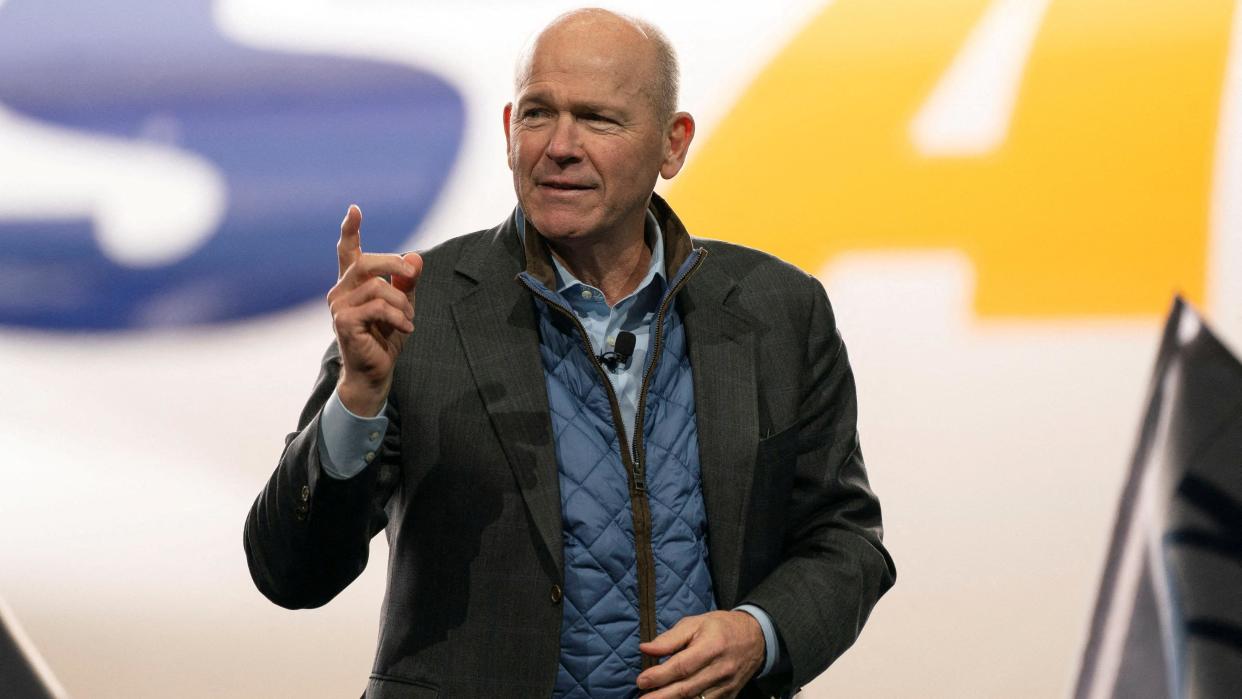Boeing boss admits culture 'far from perfect'

Boeing's chief executive Dave Calhoun will tell US lawmakers on Tuesday that he understands concerns about its safety culture after a mid-air emergency in January raised alarm.
In prepared remarks ahead of the US Senate sub-committee hearing, he said: "Our culture is far from perfect, but we are taking action and making progress. We understand the gravity."
The company has been in the spotlight since an unused door fell off a brand new 737 Max plane during a flight operated by Alaska Airlines, leaving a gaping hole in its side.
As part of an ongoing investigation, Boeing whistleblowers told the Senate in April that the 737 Max, the 787 Dreamliner and the 777 models had serious production issues.
Mr Calhoun, who has led the company since 2020, is expected to face tough questions about how Boeing responded when concerns were raised.
Ahead of the hearing, the Senate shared a report detailing concerns shared by whistleblowers in recent weeks, including allegations that the company had lost track of faulty parts, which staff sometimes tried to use in planes even after issues were identified.
The report said the accounts and other documents "paint a troubling picture of a company that prioritises speed of manufacturing and cutting costs over ensuring the quality and safety of aircraft".
Concerns about Boeing's attitudes toward safety and quality control conditions in its factories are not new, however.
The company faced intense criticism five years ago, after two 737 Max aircraft were lost in separate, but almost identical accidents, killing 346 people.
Mr Calhoun is also expected to apologise to the families affected on Tuesday in what will mark his first time giving testimony in front of the panel during his time as chief executive.
“We are deeply sorry for your losses,” his prepared opening comment says. “Nothing is more important than the safety of the people who step on board our airplanes."
Mr Calhoun is stepping down as Boeing's chief executive at the end of this year after less than five years in the role and with a pay package worth $33m.
He took over from former boss Dennis Muilenburg when the company was reeling from the aftermath of the fatal crashes.
In October 2018, the Lion Air crash led to a temporary grounding of the Boeing 737 Max.
All 189 people on the flight died after the aircraft crashed into the Java Sea 13 minutes after take-off from Jakarta, Indonesia.
In March 2019, an Ethiopian Airlines flight, which was a Boeing 737 Max, crashed six minutes after take-off from the Ethiopian capital of Addis Ababa.
All 157 on-board were killed and both these crashes were linked to faulty flight control systems.
Since the 2018 and 2019 incidents, family members of those killed, some of whom are still working to resolve legal claims against the firm, have spoken out.
Several are planning to attend the hearing on Tuesday.
Zipporah Kuria, who lost her father in the 2019 crash, is one of them.
'We will not rest until we see justice'
"I flew from England to Washington, DC, to hear in person what the Boeing chief executive has to say to the Senate and to the world about any safety improvements made at that corporation," she said in a statement ahead of the hearing.
"We will not rest until we see justice," she added.
Speaking ahead of the hearing on Tuesday, Senator Richard Blumenthal, who chairs the panel, said in a statement: "Boeing must repair a broken safety culture and that is management's task ahead."
"Years of putting profits ahead of safety, stock price ahead of quality, and production speed ahead of responsibility has brought Boeing to this moment of reckoning, and its hollow promises can no longer stand," he added.
Mr Calhoun also said in his prepared remarks that it was "thankful" there were no fatalities during the Alaska Airlines incident.
"I come from this industry, and I know full well that this is an industry where we simply must get it right, every time," he wrote.
He also added that in the wake of the incident, the company has co-operated with investigations by US authorities, as well as listening to employees and holding "stand downs" in plants to address any potential issues.
In May, the company also presented regulators with a plan aimed at improving the quality of its aircraft.


